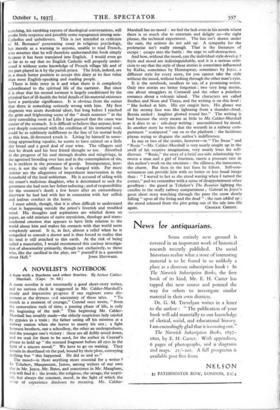A NOVELIST'S NOTEBOOK
A Date with a Duchess and other Stories. By Arthur Calder- Marshall. (Cape. 7s. 6d.) A Goon novelist is not necessarily a good short-story writer, and no serious check is suggested in Mr. Calder-Marshall's steady and impressive progress if one registers some dis- content at the dryness Er d uncetainty of these tales. "To snatch in a moment of courage," Conrad once wrote, " from the remorselesi rush of time, a passing phase of life, is only the beginning of the task." This beginning Mr. Calder- Marshall has notably made—the elderly suspicious lady cajoled by gypsies in a train ; the father seeing off his mistress at a railway station when she leaves to marry his son ; a fight between brothers, one a schoolboy, the other an undergraduate, and the younger one's victory : these are all deftly noted down, and we wait for them to be used, for the author in Conrad's Phrase to hold up " the rescued fragment before all eyes in the light of a sincere mood." We have to go on waiting. They remain in shorthand on the pad, bound by their plots, conveying nothing but " this happened. lie did so and so."
The mood—is there anything more essential for a writer In Tchehov, Maupassant, James, among writers of our own day in Mr. Joyce, Mr. Bates, and sometimes in Mr. Maugharn, you will find it : the ironic, the religious, the savage, the scepti- cal, but always the constant, mood, in the light of which the' scrap of experience discloses its meaning. Mr. Calder- Marshall has no mood : we feel the lack even in his novels where there is so much else to entertain and delight us—the right phrase, the technical experiment. The line isn't drawn under the sum, the actions do not add up. A sympathy for the proletariat isn't really enough. That is the literature of escape : escape into the battle : the urge to self-destruction.
And how, without the mood, can the individual style-develop ? Style and mood are indistinguishable, and it is a serious criti- cism to say that the style of these stories is sometimes influenced by Kafka, sometimes by Hemingway, sometimes by Joyce, a different style for every story, for you cannot take the style without the mood, without looking through the other man's eyes.
It is the notebook, needless to say, of a promising writer. Only two stories are better forgotten : two very long stories, one about smugglers in Cornwall and the other a pointless romance about a volcanic island. The characters are called Stethos and Nous and Thaya, and the writing is on this level : " She looked at him. His eye caught hers. His glance out of his stormy face was like lightning from a thunder-cloud. Bernia smiled : laughter glowed round her." The writing is bad because the story means as little to Mr. Calder-Marshall as it does to us : nib-deep writing : unconditioned by mood. In another story he writes that the warmth in a railway com- partment " scampered " out on to the platform : the factitious phrase trying to disguise the author's indifference.
In one or two of the stories, however—in "The Swan" and " Rosie "—Mr. Calder-Marshall is very nearly caught up in the swell of his creative imagination, very nearly loses his self- distrust. " Rosie," the story of a brief sea-side relationship be- tween a man and a girl of fourteen, exerts a pressure rare in this author's work on the emotions : the silliness, the innocence, the charm. But then in the last lines he falters. Self-con- sciousness can provide him with no better or less banal image than : " I waved to her as she stood waving when I turned the corner," and we remember with a sense of disappointment other goodbyes : the guard in Tchehov's The Beauties lighting the candles in the stuffy railway compartment ; Gabriel in Joyce's great short story watching through the pane the snow slowly falling " upon all the living and the dead " : the sum added up : the mood released from the plot going out of the tale into life






































 Previous page
Previous page